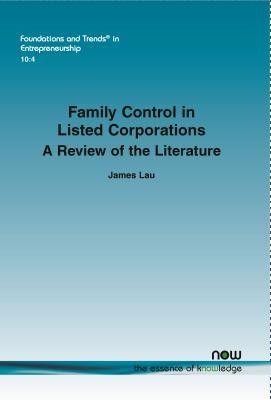
- We will send in 10–14 business days.
- Author: James Lau
- Publisher: Now Publishers
- ISBN-10: 1601988729
- ISBN-13: 9781601988720
- Format: 15.6 x 23.4 x 0.5 cm, minkšti viršeliai
- Language: English
- SAVE -10% with code: EXTRA
Reviews
Description
Given the significant representation of family firms across most major listed exchanges, there have been growing numbers of empirical studies in recent years that examine the impact of family control on corporate behavior. Family Control in Listed Corporations aims to synthesize selected published empirical studies in relation to listed family corporations. It discusses the empirical findings, evaluates the contribution of existing empirical studies, identifies the limitations of these studies, and provides future research directions. The review contributes to the family business literature in two ways. First, it discusses the empirical findings and it evaluates the contribution of existing empirical studies. Second, this monograph identifies the limitations of existing empirical studies and it provides future research directions. After the introduction, Section 2 discusses whether family control affects firm performance. Section 3 reviews studies of the preference of family firms for various leverage and financing methods. This section also discusses the investing activities in family firms, which include diversification, merger and acquisition, and research and development. Section 4 examines empirical evidence in relation to the corporate disclosure practices of family firms. Section 5 reviews the empirical studies of various corporate governance issues in family firms, which include the role of independent directors and institutional investors, and the use of control enhancing mechanisms by family shareholders. Section 6 considers the impact of family control on some socio-economic issues such as economic development, tax evasion and corporate downsizing. Finally, Section 7 discusses the limitations of the existing body of literature and provides suggestions for future research directions.
EXTRA 10 % discount with code: EXTRA
The promotion ends in 21d.13:27:13
The discount code is valid when purchasing from 10 €. Discounts do not stack.
- Author: James Lau
- Publisher: Now Publishers
- ISBN-10: 1601988729
- ISBN-13: 9781601988720
- Format: 15.6 x 23.4 x 0.5 cm, minkšti viršeliai
- Language: English English
Given the significant representation of family firms across most major listed exchanges, there have been growing numbers of empirical studies in recent years that examine the impact of family control on corporate behavior. Family Control in Listed Corporations aims to synthesize selected published empirical studies in relation to listed family corporations. It discusses the empirical findings, evaluates the contribution of existing empirical studies, identifies the limitations of these studies, and provides future research directions. The review contributes to the family business literature in two ways. First, it discusses the empirical findings and it evaluates the contribution of existing empirical studies. Second, this monograph identifies the limitations of existing empirical studies and it provides future research directions. After the introduction, Section 2 discusses whether family control affects firm performance. Section 3 reviews studies of the preference of family firms for various leverage and financing methods. This section also discusses the investing activities in family firms, which include diversification, merger and acquisition, and research and development. Section 4 examines empirical evidence in relation to the corporate disclosure practices of family firms. Section 5 reviews the empirical studies of various corporate governance issues in family firms, which include the role of independent directors and institutional investors, and the use of control enhancing mechanisms by family shareholders. Section 6 considers the impact of family control on some socio-economic issues such as economic development, tax evasion and corporate downsizing. Finally, Section 7 discusses the limitations of the existing body of literature and provides suggestions for future research directions.


Reviews